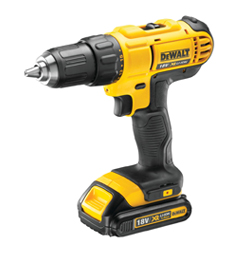
Have you ever wondered which drill machine is right for your project?
With so many options available, choosing the right drill machine can feel overwhelming, whether you're a DIY enthusiast, a construction worker, or an industry professional. Understanding the strengths and limitations of each type helps you make better choices, saving both time and effort. In this article, we'll discuss the most common types of drill machines, their advantages, and their disadvantages for different jobs.
1. Hand Drill (Manual Drill)
What is it?
The hand drill is a simple, manually operated tool used for light drilling tasks. It works by rotating a handle to drill holes into materials like wood or soft plastic.
Pros:
- Require no electricity to work
- Very portable and lightweight.
- Ideal for small, delicate jobs where precision is key.
Cons:
- Not suitable for heavy-duty tasks or hard materials like metal.
- Requires manual effort, which can be tiring for larger projects.
- Slower compared to powered options.
Best For: Small DIY projects, craftwork, and light repairs.
2. Corded Electric Drill
What is it?
A corded drill is powered by electricity and requires a continuous power connection. It is one of the most common and versatile types of drill machines.
Pros:
- Provides consistent power without interruptions.
- Suitable for heavy-duty tasks like drilling into concrete or thick metal.
- Affordable and durable for long-term use.
Cons:
- Not portable; requires access to an electrical outlet.
- Can be heavy and less flexible in tight spaces.
Best For: Professional work, construction sites, and tasks requiring high power output.
3. Cordless Drill (Battery-Powered Drill)
What is it?
Cordless drills operate on rechargeable batteries, offering flexibility and portability for various jobs.
Pros:
- Convenient for quick tasks and work in tight spaces.
- Lightweight and user-friendly.
Cons:
- Limited battery life; requires recharging or spare batteries.
- Less powerful compared to corded drills for heavy-duty work.
- Batteries can wear out over time, leading to additional costs.
Best For: DIY projects, home repairs, and outdoor tasks where portability is needed.
4. Hammer Drill
What is it?
A hammer drill is a powerful tool designed for drilling into hard surfaces like concrete, brick, and masonry.
Pros:
- Ideal for tough jobs requiring drilling into solid materials.
- Saves time and effort compared to regular drills.
- Durable and long-lasting for demanding projects.
Cons:
- Heavier and more expensive than standard drills.
- Produces significant noise and vibrations.
- Not ideal for light or precision tasks.
Best For: Construction work, masonry projects, and concrete drilling.
5. Impact Drill (Impact Driver)
What is it?
An impact drill is primarily used for driving screws and bolts into tough materials. It provides high torque and delivers rotational force with bursts of impact.
Pros:
- Excellent for driving large screws quickly and efficiently.
- Compact, lightweight, and easy to handle.
- Perfect for repetitive tasks that require torque.
Cons:
- Limited drilling capabilities compared to other types.
- Can be noisy during use.
- Not suitable for precision drilling.
Best For: Assembly tasks, woodworking, and projects involving screws and fasteners.
6. Bench Drill (Drill Press)
What is it?
A bench drill is a stationary drill machine mounted on a table or workbench. It is mainly used for precision drilling in workshops.
Pros:
- Provides high precision and accuracy for drilling holes.
- Great for repetitive tasks with consistent results.
- Can handle heavy-duty materials like metal and thick wood.
Cons:
- Not portable; requires a fixed workspace.
- Expensive compared to handheld drills.
- Limited to stationary tasks.
Best For: Workshops, manufacturing, and jobs requiring precise drilling.
7. Rotary Drill
What is it?
Rotary drills are versatile tools used for both drilling and chipping tasks, especially in masonry and concrete work.
Pros:
- Highly powerful for heavy-duty projects.
- Capable of drilling and breaking through hard surfaces.
- Durable and efficient for large-scale jobs.
Cons:
- Heavier and more challenging to handle.
- Requires more skill and experience to operate.
- Expensive compared to basic drills.
Best For: Construction sites, demolition tasks, and large-scale masonry work.
8. Right-Angle Drill
What is it?
A right-angle drill is specifically designed to work in tight or awkward spaces, where regular drills cannot reach.
Pros:
- Compact design allows access to confined areas.
- Perfect for plumbing, electrical work, and cabinetry.
- Lightweight and easy to maneuver.
Cons:
- Limited power for heavy-duty jobs.
- More expensive than standard drills.
- Specialized use; not versatile for all tasks.
Best For: Plumbing, carpentry, and working in tight corners.
Conclusion
Choosing the right drill machine depends on the type of job you're tackling. For light and precise tasks, a hand drill or cordless drill works best. For heavy-duty work, options like the corded drill, hammer drill, or rotary drill are more suitable. If you need precision and consistency, a bench drill offers excellent results, while right-angle drills and impact drills serve more specialized purposes.
Understanding the pros and cons of each drill machine allows you to pick the right tool for the job, improving efficiency and delivering the best results. Whether you're working on DIY projects at home or managing professional tasks, the right drill machine can make all the difference.





